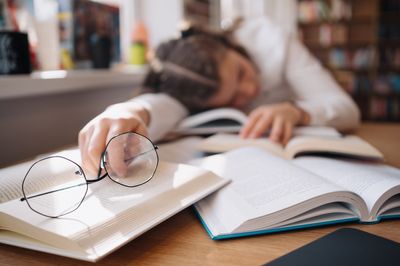Learning while you sleep
During sleep our brain rests and rejuvenates and, importantly, learnings from the day become embedded in our memory.
During sleep our brain rests and rejuvenates and, importantly, learnings from the day become embedded in our memory.
“When our brain doesn’t have time to rejuvenate, that has a negative impact on mood, concentration and problem-solving. We won’t think clearly and we will have difficulty forming memories of new things that we’ve learned,” explains Amanda Ryan, Psychology teacher at Haileybury.
“At the same time, during the night we move through different sleep cycles. We spend about 80 per cent of our night in non-REM sleep and that is when our muscles repair, our energy supply is replenished and growth hormones are released.
“The other part of our sleep is REM sleep and this is when our brain consolidates memories and learnings that are formed during the day.”
During this sleep stage, nerve cells in the brain communicate and connect, strengthening our ability to remember what we’ve learned during the day. Importantly, this memory enhancing sleep happens mostly during the second half of the night.
“So, if your child is only getting four or five hours of sleep, they are missing out on some of that time when consolidation and learning happens,” says Amanda.
For adolescents and teenagers though, getting enough sleep can be challenging because they must work against their natural body clock. They release the sleep hormone, melatonin, about two hours later than adults and younger children, so may not actually feel tired until later at night.

By the time young people reach the age of about 20, melatonin release happens earlier making it easier for young people to fall asleep earlier.
“I still think there’s a lack of understanding about what goes on in our brain when we sleep,” says Diane Furusho, Deputy Principal – Student Wellbeing.
“Without your child knowing it, their brain is making important connections and storing things away and your child is learning while they sleep. There’s a lot of brain activity and deep learning happening and so it’s vital that children develop good sleep hygiene and sleep routines and parents can support them to do that.”
The Sleep Health Foundation recommends that children aged six to 13-years-old should sleep for nine to 11 hours. Teenagers aged 14 to 17 years should ideally sleep for 8 to 10 hours.
Watch the video below for a recording of our recent Learn While You Sleep webinar event. Diane Furusho, Deputy Principal Student Wellbeing, Amanda Ryan and Ana Visic, two of our Haileybury Psychology Teachers share how the brain learns while sleeping, and how lack of it impacts today's students.
Our panel explored the importance of sleep and the processes that happen each night that help embed what children have learned throughout the day, how sleep impacts a child's physical and mental wellbeing, and what goes on in the brain while they are sleeping.
Type on the line above then press the Enter/Return key to submit a new search query